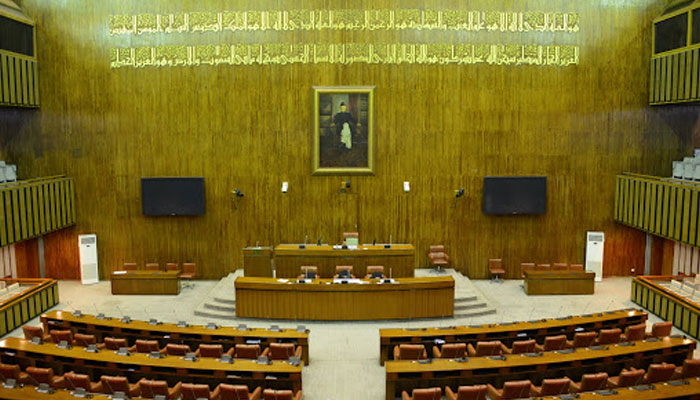Three months after Senate elections: Once vibrant committee system still not back on track
ISLAMABAD: The Senate committee system is yet to get back on track nearly three months after the election to half of the Upper House of Parliament.
The standing committees are still in the process of constitution and the election of their chairmen is still underway. In the absence of a functioning committee system, the business of law-making is at a standstill with no House panel having any important piece of legislation for consideration. The Senate adopts bills only after their clearance by the concerned standing committee.
Even otherwise, the Senate does not have much of a legislative agenda before it. The much-touted election reforms, which have been partially introduced through a presidential ordinance, have still not been laid before the Upper House. They mainly provide for the use of electronic voting machines (EVMs) by the Election Commission of Pakistan (ECP) in parliamentary polls and voting rights to overseas Pakistanis. However, even after the legislation by the executive in the form of an ordinance, the ECP has been lukewarm on the use of EVMs as well as giving the right of vote to overseas Pakistanis on the grounds that both suggestions are impractical. The ordinance has also been challenged by the Pakistan Muslim League-Nawaz (PML-N) in the Islamabad High Court (IHC).
The record shows that at present the Senate has only four bills for consideration that it has received from the National Assembly after approval. They are the Pakistan Arms (Amendment) Bill, Pakistan PAF War College Institute Bill, Islamabad Capital Territory Seniors Act and the Domestic Violence (Prevention and Protection) Bill.
As per the respective numerical strengths of the ruling coalition and the opposition parties, the two sides have bagged, or are in the process of getting, due representation in the Senate committees as well as for the posts of their chairmen. They have ultimately worked out a formula for due representation after a lot of wrangling.
Even after their defeat in the election for the Senate chairman, the opposition parties have a visible edge over the ruling alliance in the Upper House. Keeping this factor in view, pushing through legislation of its choice is not easy for the government. A bipartisan approach may be needed for smooth legislation in the future. Recently, the China Pakistan Economic Corridor Authority Bill, which was held up for more than a year, was finally passed by the Senate after the opposition relented.
Before the Senate elections, the governing alliance was very optimistic arguing that the electoral outcome would enable it to accelerate its legislative reform agenda that it had promised to the nation. However, any practical steps towards this end continue to be absent three months after the Senate polls. It is likely that the government will try to push its bills through the Senate after the process of deciding the composition of the standing committees and selection of their chairmen is completed.
Unlike the situation in the National Assembly, the Senate committee system has traditionally been very vibrant and robust since 1985. It is known to deliberate seriously upon a host of important national issues and its committees have come up with many significant reports on various key matters.
-
 Breaking: 2 Dead Several Injured In South Carolina State University Shooting
Breaking: 2 Dead Several Injured In South Carolina State University Shooting -
 China Debuts World’s First AI-powered Earth Observation Satellite For Smart Cities
China Debuts World’s First AI-powered Earth Observation Satellite For Smart Cities -
 Royal Family Desperate To Push Andrew As Far Away As Possible: Expert
Royal Family Desperate To Push Andrew As Far Away As Possible: Expert -
 Cruz Beckham Releases New Romantic Track 'For Your Love'
Cruz Beckham Releases New Romantic Track 'For Your Love' -
 5 Celebrities You Didn't Know Have Experienced Depression
5 Celebrities You Didn't Know Have Experienced Depression -
 Trump Considers Scaling Back Trade Levies On Steel, Aluminium In Response To Rising Costs
Trump Considers Scaling Back Trade Levies On Steel, Aluminium In Response To Rising Costs -
 Claude AI Shutdown Simulation Sparks Fresh AI Safety Concerns
Claude AI Shutdown Simulation Sparks Fresh AI Safety Concerns -
 King Charles Vows Not To Let Andrew Scandal Overshadow His Special Project
King Charles Vows Not To Let Andrew Scandal Overshadow His Special Project -
 Spotify Says Its Best Engineers No Longer Write Code As AI Takes Over
Spotify Says Its Best Engineers No Longer Write Code As AI Takes Over -
 Michelle Yeoh Addresses 'Wicked For Good' Snub At 2026 Oscars
Michelle Yeoh Addresses 'Wicked For Good' Snub At 2026 Oscars -
 Trump Revokes Legal Basis For US Climate Regulation, Curb Vehicle Emission Standards
Trump Revokes Legal Basis For US Climate Regulation, Curb Vehicle Emission Standards -
 DOJ Blocks Trump Administration From Cutting $600M In Public Health Funds
DOJ Blocks Trump Administration From Cutting $600M In Public Health Funds -
 2026 Winter Olympics Men Figure Skating: Malinin Eyes Quadruple Axel, After Banned Backflip
2026 Winter Olympics Men Figure Skating: Malinin Eyes Quadruple Axel, After Banned Backflip -
 Meghan Markle Rallies Behind Brooklyn Beckham Amid Explosive Family Drama
Meghan Markle Rallies Behind Brooklyn Beckham Amid Explosive Family Drama -
 Scientists Find Strange Solar System That Breaks Planet Formation Rules
Scientists Find Strange Solar System That Breaks Planet Formation Rules -
 Backstreet Boys Voice Desire To Headline 2027's Super Bowl Halftime Show
Backstreet Boys Voice Desire To Headline 2027's Super Bowl Halftime Show




